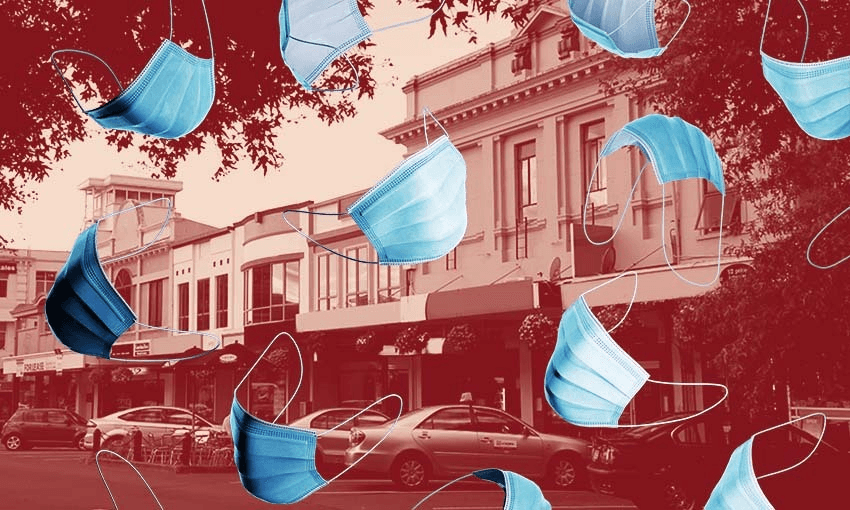The retail industry is calling for more government support following reports of a rise in aggressive incidents around mask use. Naomii Seah investigates.
“People who don’t have genuine reasons for not wearing a mask are, ultimately, just endangering the health of themselves and others,” says Greg Harford, CEO of Retail NZ.
At the orange and red traffic light settings, masks are mandatory on public transport, public facilities and in retail settings. However, mask exemptions can be issued for those with a health issue or disability that prevents them from wearing a mask. Certain sections of the population, such as under 12s, are also exempt.
But under the current regulations, those with mask exemptions aren’t required to carry their exemption card, and when asked, are “not obliged to show an exemption card”.
Claire Terry, who owns and operates Madame Fancy Pants in Wellington, says the policy creates “a gap” in New Zealand’s Covid-19 response.
“If I was a jerk,” says Terry, “I could just walk around without a mask on and be like, ‘what of it, I don’t have to show you my exemption’.”
Harford notes that this scenario has been a reality for many members of Retail NZ, which accounts for around two thirds of New Zealand’s retail turnover. He says incidents of aggression in retail stores have doubled from 2019-2020, and again from 2020-2021.
“A lot of that [aggression] is around the current requirements, like wearing a mask,” says Harford. “There are lots of people who don’t like the fact that they have to wear a mask in store, and when they’re being asked to put a mask on or being asked to show some evidence that they have an exemption, they’re often abusing retail staff.”
Although he doesn’t have an exact figure, Harford says incidences of aggression in retail stores over the last few years now number in the thousands.
“The number of people not wearing masks should be very small,” says Harford, “[and] there needs to be a proper medical assessment… and documentation of that. There needs to be a process like we have done with the vaccine pass.”
As of October 2021, the number of mask exemption cards issued by the Disabled Persons Assembly NZ (DPA) accounts for just 0.15% of New Zealand’s population – around 8,000 people. But the organisation has seen a massive influx of exemption card requests in recent months.
Prudence Walker, CEO of the DPA, notes that the organisation only has the power to issue exemption cards, not assess whether someone genuinely needs one, and the current public health order states that those requesting cards need only self-identify as falling under the exemptions.
“We don’t have any authority to decide if people are exempt or not,” says Walker, who acknowledges that this lack of clarity may be difficult for the retail industry and others working in public-facing services. She also argues that requiring maskless individuals to provide an exemption card may not be as simple as it initially appears.
“Some of the people involved in [anti-masking] groups may have legitimate reasons to receive an exemption,” says Walker, who speculates that this intersection may stem from a feeling of alienation from the general public due to lack of understanding around mask exemptions. Walker further notes that some mask-exempt individuals may have a history of trauma that may cause them to react negatively when approached by retail or public-facing staff. Mandating mask-exemption passes for such people may also be challenging since there’s a good chance their trauma was not reported or attached to any formal diagnosis.
“If we’re talking about the overall health of our population,” says Walker, “these are the things that we have to consider”.
“I don’t think anything’s foolproof.”
But Terry, who had a recent incident in-store with a customer claiming to have a mask exemption while refusing to show evidence of said exemption to staff, said she would still like to see some form of government regulation.
Terry recently reached out to the government-run Covid response team on Instagram (@uniteagainstcovid19) to ask about “our rights as business owners to enforce the government recommendations”. The team reiterated that those with mask exemptions are not required to carry or show their exemptions.
In an email, a spokesperson for the Department of the Prime Minister and Cabinet said “it is the responsibility of each individual to make sure they are wearing a face covering in the places and situations required at each traffic light setting, unless they are exempt”.
Terry noted that “they [didn’t] really answer my question,” which left her feeling “really let down”. “[I’m] someone who’s trying to do the right thing for everybody, doing what the government is telling us to do.”
Businesses need more support from the government on the masking issue, says Terry. She believes that “if you don’t have a mask, and you don’t show the exemption, then you [should have] to leave”.
“How [else] do we protect ourselves? How [else] do we protect our customers that are vulnerable?”
Currently, the only option for businesses who are concerned about customers “being dishonest” is to call the police. The Ministry of Health’s website currently states that “people who refuse to wear a face covering and falsely claim to be exempt from wearing a face covering when they are not, could be liable for an infringement fee of $1,000; or up to $4,000 if the matter goes to court”.
Terry points out that this still puts the onus on businesses to enforce government mandates.
“Wearing the mask is about keeping yourself safe and keeping other people safe,” adds Harford, who notes that “customers [should] remember that they do generally have options as well. They don’t have to go into the store to shop. They can order online, in many cases they can order over the phone.
“Even if you don’t like mask rules very much,” Harford continues, “please don’t take your anger out on retail workers.”



